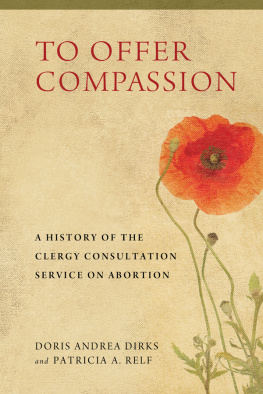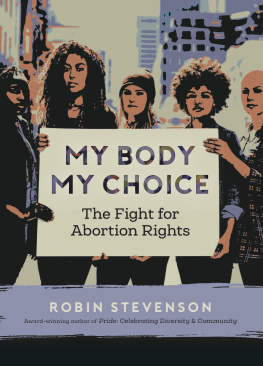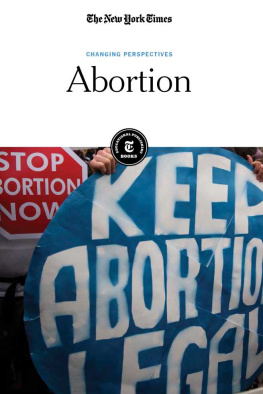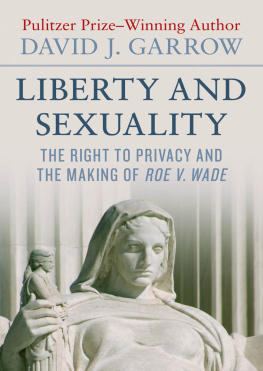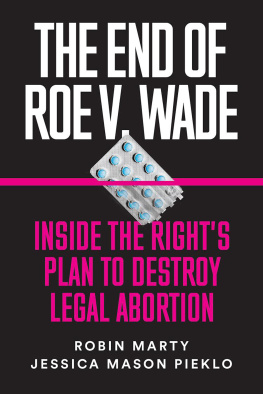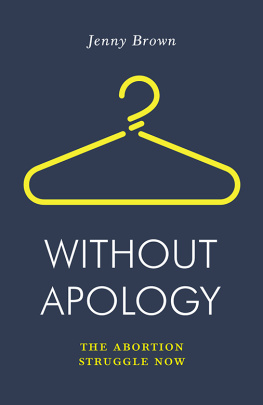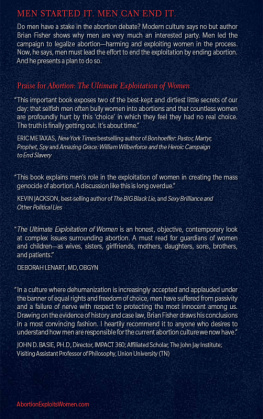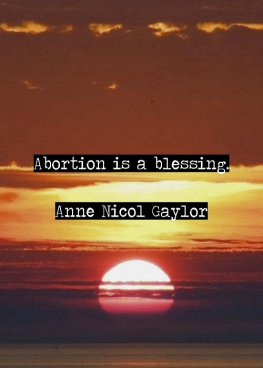All rights reserved. Except in the case of brief quotations embedded in critical articles and reviews, no part of this publication may be reproduced, stored in a retrieval system, transmitted in any format or by any meansdigital, electronic, mechanical, photocopying, recording, or otherwiseor conveyed via the Internet or a website without written permission of the University of Wisconsin Press. Rights inquiries should be directed to .
This book may be available in a digital edition.
Acknowledgments
The story of the Clergy Consultation Service on Abortion (CCS) is the story of its members, and we owe our greatest debt to the participants who talked with ussometimes at great length and in multiple sessions. The clarity and immediacy of their recollections astounded us. For many, the memory of particular women they had counseled brought tears to their eyes decades after the fact. We thank them for the caring support they gave as CCS counselors, and we thank them for sharing their stories. We also spoke with a number of people who worked with, used, or otherwise had memories of the CCS, and we are grateful for the light they shed on the group. We interviewed more than seventy people for this book, and although we didnt cite all of them, we did learn a great deal from each one.
We were lucky enough to get to know Howard Moody best. We had several lengthy interviews in person, spoke by telephone, chatted when we visited Judson Memorial Church, and we were treated to a beautiful brunch when we visited him and Lorry in Santa Barbara. We both wished to adopt ourselves into their family, and we felt Howards death deeply. He was a truly prophetic voice, decades ahead of his time, and one of the most genuinely compassionate people we had ever met. He was confident and far from reticent in speaking about the causes that mattered to him, yet he was also genuinely humble, always praising the contributions of others and never claiming direct credit for the ideas and work for which he had, at the very least, been a driving force. He made it possible for us to study the otherwise closed CCS archive at New York University, and his trust in us to use it carefully was one of the best gifts we could have received. To Howard and Lorry, we offer our heartfelt thanks and love.
We also spent many days poring over archival materials, and we thank the librarians, archivists, and assistantsoften studentswho were unfailingly helpful and gracious. Thanks to the staff of the archives weve cited, not only for their help at the time but for so carefully preserving these valuable materials and making them available to researchers. We owe particular thanks to MarvinJ. Taylor, now director of Special Collections at New York Universitys Fales Library. The CCS archive there was the first we visited, and although the archive was embargoed at the time, he told us that there were many nonsensitive itemsnewspaper clippings, for instancein the collection and encouraged us to ask Howard Moody for access to those, which he and his staff were willing to extract.
One of the archives we consulted consisted of the private research papers of Joshua D. Wolff, who grew up at Judson and wrote his undergraduate thesis on the CCS at Amherst in 1998. Josh went on to earn a doctorate and become a published historian. He had also helped prepare Moodys files for donation to the Judson archive at NYU and so had access to material that we did not at first. We were fortunate to meet Josh as we were just beginning this project, and he could not have been more encouraging and helpful. We owe him tremendous thanks for his ongoing support and generosity in sharing files.
Similarly, Abigail Hastings, a longtime Judson member who helped Howard Moody with his memoir, A Voice in the Village, was an early encourager and had somethingperhaps a great dealto do with persuading Moody to make the CCS archive at NYU available to us.
One of our very earliest encouragers was Rev. Mark Pawlowski, then the chief executive of Planned Parenthood of South Central Michigan (which is now part of Planned Parenthood of Mid and South Michigan). Mark offered introductions to many of our first interviewees and other contacts. Friends at the Kalamazoo affiliate of Planned Parenthood were all early and enthusiastic cheerleaders for this project, and we thank them.
We have many other friends who have shown their interest and support over the course of this extended undertaking. In all of these fifteen years, not one has revealed to us the slightestand justifiabledoubt that we would finish the project. Instead, they have offered patient ears, kind suggestions, and fortifying words. Thanks to them all. Special thanks to Louise Hanavan and other friends and family who inspired and taught us through their own activism; and Bridget Carol, who helped us transcribe some of the interviews. Most of all, we thank Scott Murray for his encouragement and his historians eye on our work; Emily Hanavan Leslie for her research assistance and for being a mighty advocate for women, putting her work where her conscience is; and Bill Hanavan for supporting the project in every way, including subsidizing our travel.
Finally, we thank Gwen Walker, our editor at University of Wisconsin Press, for championing this book, and to all at the press who have helped make it into a real thing. We are glad the story and lessons of the CCS will be shared with a new generation.
Preface
In January 2002, the Kalamazoo, Michigan, affiliate of Planned Parenthood organized an interfaith service honoring the anniversary of the 1973 Roe v. Wade Supreme Court decision, which legalized abortion in the United States. A Planned Parenthood board member at the time, Pat Relf attended the event at First Presbyterian Church and, paging through the program, came across an interesting story: the Planned Parenthood Federation of America had recently honored Rev. Robert Hare for his participation in the Clergy Consultation Service on Abortion, a network of ministers and rabbis who had referred women to physicians for safe abortions during the years before Roe v. Wade. Hare was receiving special recognition because, as a Presbyterian minister in Cleveland in 1969, he had been indicted in Massachusetts for referring a young woman to a doctor who happened to be under investigation. The charges against Hare evaporated after Roe.
Pat had never heard of the Clergy Consultation Service on Abortion (CCS), and asked First Presbyterians minister, Rev. David Van Arsdale, if he knew anything about it. Yes, Van Arsdale said; in fact, his own father, a Baptist minister in upstate New York, had been a member of the group. Pat was astonished: the CCS must have had a substantial number of members doing radicaland borderline illegalwork on behalf of women, yet she had never heard of the group, either as a Planned Parenthood volunteer or as a Presbyterianor even as a college student before and after the

